Index relies entirely on the support of donors and readers to do its work.
Help us keep amplifying censored voices today.

Photo: Instagram
Index on Censorship has expressed its concern over the unwarranted prison sentence of 34 years handed out to Saudi national Salma al-Shehab, who was a student at the University of Leeds in the UK at the time of her alleged crimes – tweeting in support of prisoners of conscience and retweeting statements of support of the Saudi activist Loujain Alhathloul.
Al-Shehab, who was studying for a PhD in oral and human health, was arrested on 15 January 2021 after going back to Saudi Arabia to spend the holiday with her husband and two children, Adam and Noah (right). It is understood she was planning to return to the UK with her family.
She was questioned for almost a year before being charged by the Specialised Criminal Court under various parts of the country’s Counter-Terrorism Law and the Anti-Cybercrime Law for “supporting those seeking to disrupt public order, undermining the safety of the general public and stability of the state, and publishing false and tendentious rumours on Twitter”, according to the Gulf Centre for Human Rights (GC4HR).
Al-Shehab was initially handed a six-year sentence last year but on appeal this was increased to 34 years, including a discretionary five years added by the judge. She has also been slapped with a travel ban for a further 34 years following her sentence.
The GC4HR says the sentence is the longest ever given to a peaceful activist.
Jemimah Steinfeld, editor-in-chief of Index on Censorship, said: “Index condemns the 34-year sentence passed on Salma Al-Shehab and calls for her immediate and unconditional release. The decision of the Saudi authorities to charge Salma for merely retweeting other people’s tweets while at university in the UK is yet another example of the growing trend of authoritarian governments to apply their draconian laws beyond their own borders.”
She added: “We fear we are sleep-walking into a situation where no one is safe from any law, no matter where in the world they are, and we call on the international community to unite in their condemnation of her sentencing. Using your voice to dissent should not be a crime, nor should supporting others who do.”
One of Al-Shehab’s supposed crimes was to tweet about prisoners of conscience and to retweet tweets relating to the Saudi women’s rights defender Loujain Alhathloul, one of six jailed people that Index supported in our 2020 end of year campaign. Alhathloul was eventually released in 2021.
In a pinned tweet, published on 30 August 2019, al-Shehab said, “I reject injustice, and support the oppressed…. Freedom for prisoners of conscience and for all the oppressed in the world.”
Loujain’s sister Lina Alhathloul, head of monitoring and communications for ALQST, an independent NGO established in 2014 by Saudi Arabian human rights defender Yahya Assiri, said: “This appalling sentence makes a mockery of the Saudi authorities’ claims of reform for women and of the legal system, and shows that they remain hellbent on harshly punishing anyone who expresses their opinions freely. Saudi activists warned Western leaders that giving legitimacy to the crown prince would pave the way for more abuses, which is unfortunately what we are witnessing now.”
The organisation said it feared al-Shehab’s sentence “may be the start of a new trend that the Saudi authorities will follow in the days ahead, as a mechanism for punishing all who criticise either their domestic or foreign policies”.
It added: “This is of particular concern now that normal diplomatic relations have been restored between Crown Prince Mohammed bin Salman and other world leaders, after having been strained since the murder of Saudi journalist Jamal Khashoggi on the crown prince’s orders.

Salman Rushdie. Credit: Fronteiras do Pensamento
On 12 August 2022, Salman Rushdie, the author of the book The Satanic Verses, was attacked as he prepared to give a lecture at the Chautauqua Institution, an arts and education centre in New York state.
Index on Censorship has supported Rushdie’s right to express himself ever since he came into the public eye more than three decades ago.
On 14 February 1989 Iran’s Ayatollah Khomeini issued a fatwa ordering Muslims to execute Rushdie over the publication of The Satanic Verses, along with anyone else involved with the novel.
Published in the UK in 1988 by Viking Penguin, the book was met with widespread protest by those who accused Rushdie of blasphemy and unbelief. Death threats and a $6 million bounty on the author’s head saw him take on a 24-hour armed guard under the British government’s protection programme.
The book was soon banned in a number of countries, from Bangladesh to Venezuela, and many died in protests against its publication, including on 24 February when 12 people lost their lives in a riot in Bombay, India. Explosions went off across the UK, including at Liberty’s department store, which had a Penguin bookshop inside, and the Penguin store in York.
Book store chains including Barnes and Noble stopped selling the book, and copies were burned across the UK, first in Bolton where 7,000 Muslims gathered on 2 December 1988, then in Bradford in January 1989. In May 1989 between 15,000 to 20,000 people gathered in Parliament Square in London to burn Rushdie in effigy.
In October 1993, William Nygaard, the novel’s Norwegian publisher, was shot three times outside his home in Oslo and seriously injured.
Rushdie came out of hiding after nine years, but as recently as February 2016, money has been raised to add to the fatwa, reminding the author As that for many the Ayatollah’s ruling still stands.
As his supporters around the world, including Index, pray for a positive outcome, we highlight key articles from our archives from before, during and after the issue of the fatwa, including two from Rushdie himself.
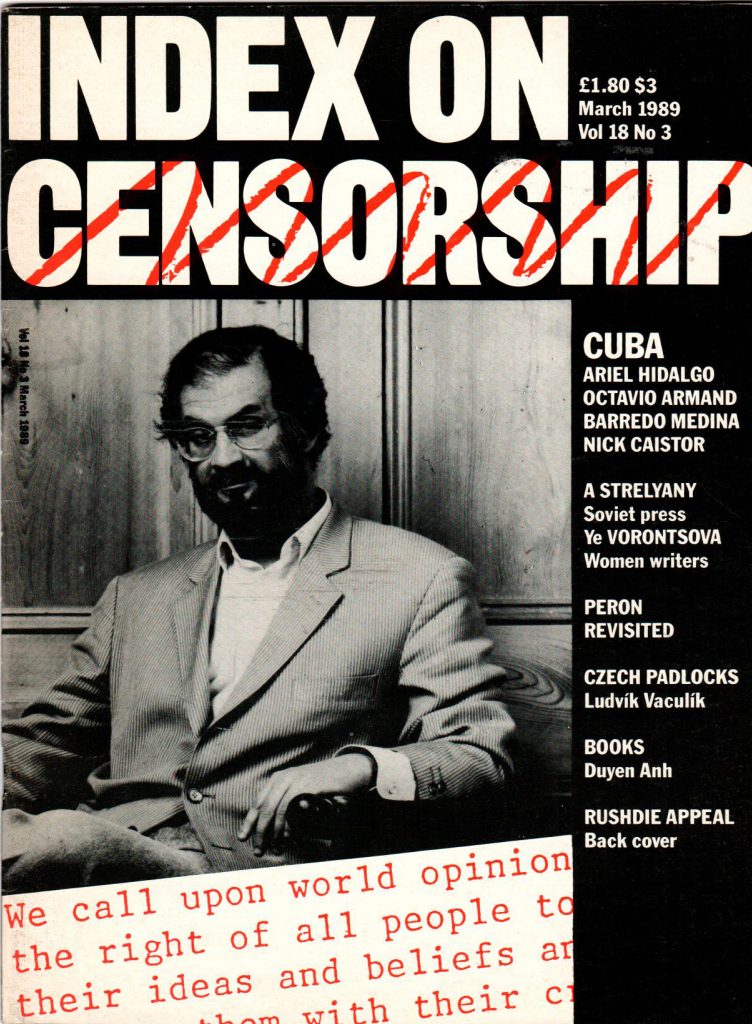
Cuba today, the March 1989 issue of Index on Censorship magazine.
World statement by the international committee for the defence of Salman Rushdie and his publishers
March 1989, vol. 18, issue 3
On 14 February the Ayatollah Khomeini called on all Muslims to seek out and execute Salman Rushdie, the author of The Satanic Verses, and all those involved in its publication. We, the undersigned, insofar as we defend the right to freedom of opinion and expression as embodied in the Universal Declaration of Human Rights, declare that we also are involved in the publication. We are involved whether we approve the contents of the book or not. Nonetheless, we appreciate the distress the book has aroused and deeply regret the loss of life associated with the ensuing conflict.

Islam & human rights, the May 1989 issue of Index on Censorship magazine.
Amir Taheri
May 1989, vol. 18, issue 5
‘What Rushdie has done, as far as Muslim intellectuals are concerned, is to put their backs to the wall and force them to make the choice they have tried to avoid for so long’. Last year, when poor old Mr Manavi filled in his Penguin order form for 10 copies of Salman Rushdie’s third novel, The Satanic Verses, he could not have imagined that the book, described by its publishers as a reflection on the agonies of exile, would provoke one of the most bizarre diplomatic incidents in recent times. Mr Manavi had been selling Penguin books in Tehran for years. He had learned which authors to regard as safe and which ones to avoid at all costs.

Islam & human rights, the May 1989 issue of Index on Censorship magazine.
Wole Soyinka
May 1989, vol. 18, issue 5
This statement is not, of course, addressed to the Ayatollah Khomeini who, except for a handful of fanatics, is easily diagnosed as a sick and dangerous man who has long forgotten the fundamental tenets of Islam. It is useful to address oneself, at this point, only to the real Islamic faithful who, in their hearts, recognise the awful truth about their erratic Imam and the threat he poses not only to the continuing acceptance of Islam among people of all religions and faiths but to the universal brotherhood of man, no matter the differing colorations of their piety. Will Salman Rushdie die? He shall not. But if he does, let the fanatic defenders of Khomeini’s brand of Islam understand this: The work for which he is now threatened will become a household icon within even the remnant lifetime of the Ayatollah. Writers, cineastes, dramatists will disseminate its contents in every known medium and in some new ones as yet unthought of.
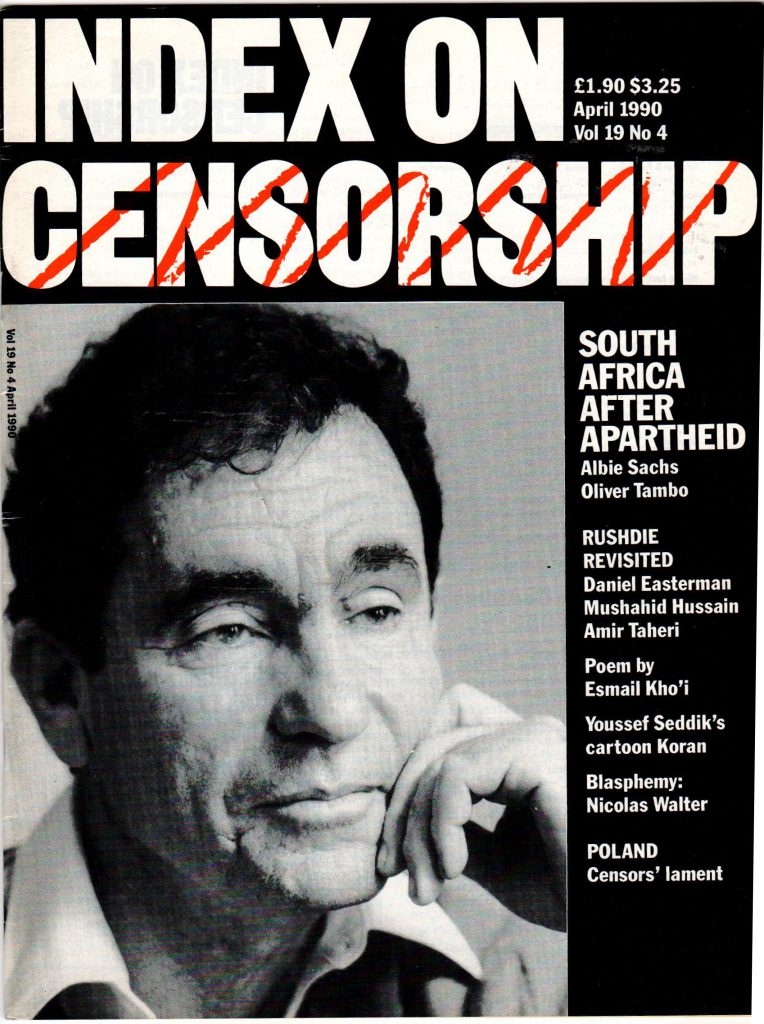
South Africa after Apartheid, the April 1990 issue of Index on Censorship magazine.
Reflections on an invalid fatwah
Amir Taheri
April 1990, vol. 19, issue 4
Broadly speaking, three predictions were made. The first was that Khomeini’s attempt at exporting terror might goad world public opinion into a keener understanding of Iran’s tragedy since the Islamic Revolution of 1979. The fact that the Ayatollah had executed thousands of people, including many writers and poets since his seizure of power in Tehran had provoked only mild rebuke from Western governments and public opinion. With the fatwa against Rushdie, we thought the whole world would mobilise against the ayatollah, turning his regime into an international pariah. Nothing of the kind happened, of course, and only one country, Britain, closed its embassy in Tehran – and that because the mullahs decided to sever.diplomatic ties. In the past twelve months Federal Germany and France have increased their trade with the Islamic Republic to the tune of II and 19 per cent respectively. The EEC countries and Japan have, in the meantime, provided the Islamic Republic with loans exceeding £2,000 million. The stream of European and Japanese businessmen and diplomats visiting Tehran turned into a mini-flood after Khomeini’s death last June.

South Africa after Apartheid, the April 1990 issue of Index on Censorship magazine.
Salman Rushdie and political expediency
Adel Darwish
April 1990, vol. 19, issue 4
When I reviewed Salman Rushdie’s Satanic Verses in September 1988, it never crossed my mind to make any reference to possible offence to Muslim readers, let alone to anticipate the unprecedented international crisis generated in the months that followed. I do not think I was naive – as an LBC radio reporter suggested when she interviewed me at the first public reading from The Satanic Verses in June 1989. On the contrary, I can claim more than many that I am able to understand what Mr Rushdie was trying to say in his book, and the way the crisis has developed. Like Mr Rushdie, I am a British writer, born to a Muslim family. Born in Egypt, I was educated and am employed in Britain, and have been preoccupied and engaged, mainly in the 1960s and 1970s, with the issues that Mr Rushdie has fought for and with which he seemed to be very much concerned in his book.
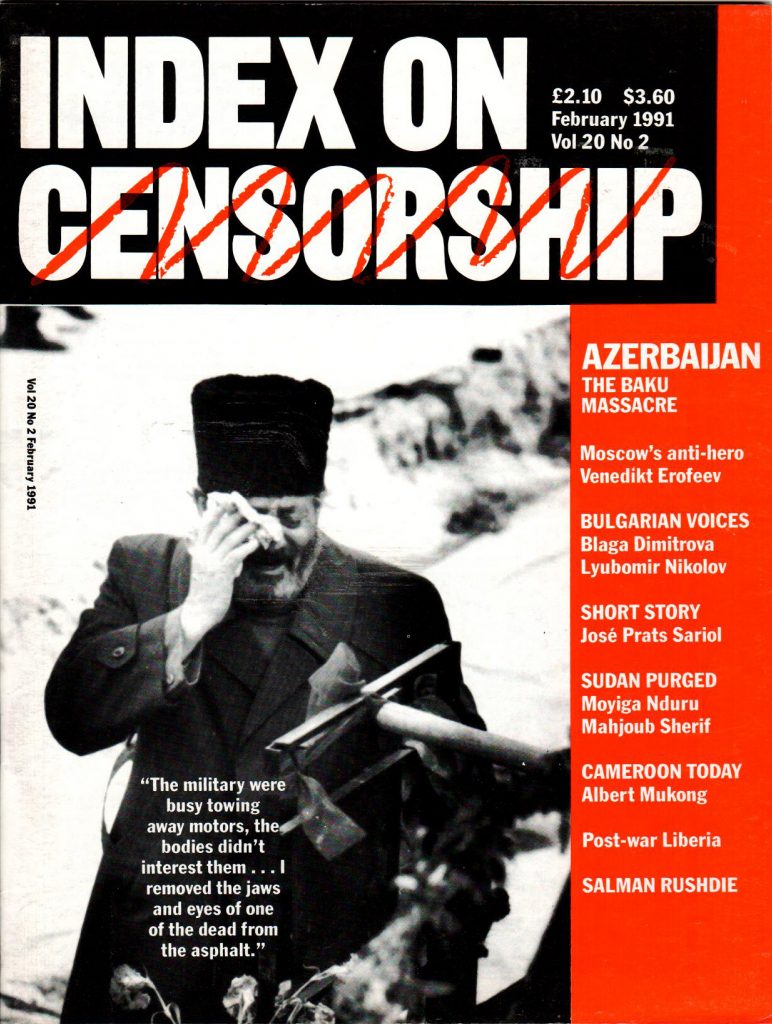
Azerbaijan, the February 1991 issue of Index on Censorship magazine.
Salman Rushdie
February 1991, vol. 20, issue 2
A man’s spiritual choices are a matter of conscience, arrived at after deep. reflection and in the privacy of his heart. They are not easy matters to speak of publicly. I should like, however, to say something about my decision to affirm the two central tenets of Islam — the oneness of God and the genuineness of the prophecy of the Prophet Muhammad —and thus to enter into the body of Islam after a lifetime spent outside it. Although I come from a Muslim family background, I was never brought up as a believer, and was raised in an atmosphere of what is broadly known as secular humanism. I still have the deepest respect for these principles. However, as I think anyone who studies my work will accept, I have been engaging more and more with religious belief, its importance and power, ever since my first novel used the Sufi poem Conference of the Birds by Farid ud-din Attar as a model. The Satanic Verses itself, with its portrait of the conflicts between the material and spiritual worlds, is a mirror of the conflict within myself.
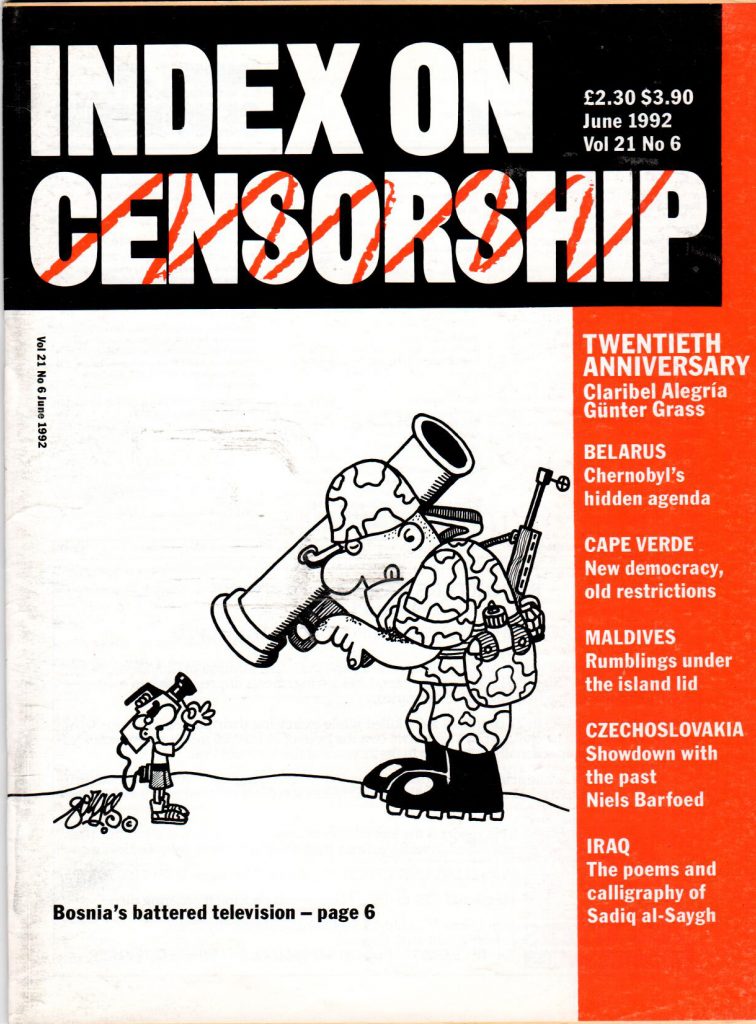
20th Anniversary: Reign of terror, the June 1992 issue of the Index on Censorship magazine.
Gunter Grass
June 1992, vol. 21, issue 6
When George Orwell returned from Spain in 1937, he brought with him the manuscript of Homage to Catalonia. It reflected the experiences he had gathered during the Civil War. At first, he was unable to find a publisher because a multitude of influential, left-wing intellectuals had no wish to acknowledge its shocking observations. They did not want to accept the Stalinist terror, the systematic liquidation of anarchists, Trotskyists and left-wing socialists. Orwell himself only narrowly escaped this terror. His stark accusations contradicted a world image of a flawless Soviet Union fighting against Fascism. Orwell’s report, this onslaught of terrible reality, tarnished the picture-book dream of Good and Evil. A year later, a bourgeois Western publisher brought out Homage to Catalonia; in the areas of Communist rule, Orwell’s works – among them the bitter Spanish truth – were banned for half a century. The minister responsible for state security= in the German Democratic Republic, right to its end, was Erich Mielke. During the Spanish Civil War, he was a member of the Communist cadre to whom purge through liquidation became commonplace. A fighter for Spain with an extraordinary capacity for survival.
Read the full article[/vc_column_text][/vc_column][/vc_row][vc_row][vc_column][vc_column_text]

Russia’s choice, the November-December 1993 issue of Index on Censorship magazine.
The Rushdie affair: Outrage in Oslo
Hakon Harket
November 1993, vol. 22, issue 10
The terrorist state of Iran must face the consequences of refusing to lift the fatwa that condemns Salman Rushdie, and those associated with his work, to death. When someone, in accordance with the express order of the fatwa, attempts to murder one of the damned, the obvious consequence is that Iran must be held responsible for the crime it has called for, at least until there is conclusive proof that no connection exists. The shooting of William Nygaard has reminded the Norwegian public of what the Rushdie affair is really about: life and death; the abuse of religion; the fiction of a free mind. This war of terror against freedom of speech is not one we can afford to lose. Since the nightmare clearly will not disappear of its own accord, it must be engaged head-on.

New censors, the March 1996 issue of Index on Censorship magazine.
March 1996, vol. 25, issue 2
This statement is not, of course, addressed to the Ayatollah Khomeini who, except for a handful of fanatics, is easily diagnosed as a sick and dangerous man who has long forgotten the fundamental tenets of Islam. It is useful to address oneself, at this point, only to the real Islamic faithful who, in their hearts, recognise the awful truth about their erratic Imam and the threat he poses not only to the continuing acceptance of Islam among people of all religions and faiths but to the universal brotherhood of man, no matter the differing colorations of their piety. Will Salman Rushdie die? He shall not. But if he does, let the fanatic defenders of Khomeini’s brand of Islam understand this: The work for which he is now threatened will become a household icon within even the remnant lifetime of the Ayatollah. Writers, cineastes, dramatists will disseminate its contents in every known medium and in some new ones as yet unthought of.
The Rushdie affair: Outrage in Oslo
Hakon Harket
November 1993, vol. 22, issue 10
The terrorist state of Iran must face the consequences of refusing to lift the fatwa that condemns Salman Rushdie, and those associated with his work, to death. When someone, in accordance with the express order of the fatwa, attempts to murder one of the damned, the obvious consequence is that Iran must be held responsible for the crime it has called for, at least until there is conclusive proof that no connection exists. The shooting of William Nygaard has reminded the Norwegian public of what the Rushdie affair is really about: life and death; the abuse of religion; the fiction of a free mind. This war of terror against freedom of speech is not one we can afford to lose. Since the nightmare clearly will not disappear of its own accord, it must be engaged head-on.

New censors, the March 1996 issue of Index on Censorship magazine.
March 1996, vol. 25, issue 2
This statement is not, of course, addressed to the Ayatollah Khomeini who, except for a handful of fanatics, is easily diagnosed as a sick and dangerous man who has long forgotten the fundamental tenets of Islam. It is useful to address oneself, at this point, only to the real Islamic faithful who, in their hearts, recognise the awful truth about their erratic Imam and the threat he poses not only to the continuing acceptance of Islam among people of all religions and faiths but to the universal brotherhood of man, no matter the differing colorations of their piety. Will Salman Rushdie die? He shall not. But if he does, let the fanatic defenders of Khomeini’s brand of Islam understand this: The work for which he is now threatened will become a household icon within even the remnant lifetime of the Ayatollah. Writers, cineastes, dramatists will disseminate its contents in every known medium and in some new ones as yet unthought of.

Tolerance and the intolerable, the May 1994 issue of Index on Censorship magazine
Salman Rushdie
May 1994, vol. 23, issue 1-2
When the Balkans War broke out, Rushdie had never been to Sarajevo, but felt that he belonged to it. He imagined a Sarajevo of the mind, whose ruination and torment exiled everyone.
He wrote: “Sarajevo’s truth is that its citizens, who reject definition by religion or confession, who wish to be simply Bosnians, have for their pains been labelled by the outside world as ‘Muslims’. It is instructive to imagine how things might have gone in former Yugoslavia if the Bosnians had been Christians and the Serbs had been Muslims, even Muslims ‘in name only’. Would Europe have supported a ‘Serbian Muslim’ carve-up of the defunct state? It’s only a guess, but I guess that it would not. Which being true, it must also be true that the ‘Muslim’ tag is part of the reason for Europe’s indifference to Sarajevo’s fate.”
Peter Mayer
December 2008, vol. 37, issue 4
As publisher of The Satanic Verses, Peter Mayer was on the front line. He writes here for the first time about an unprecedented crisis:
Penguin published Salman Rushdie’s The Satanic Verses six months before Ayatollah Khomeini issues his fatwa. When we decided to continue publishing the novel in the aftermath, extraordinary pressures were focused on our company, based on fears for the author’s life and for the lives of everyone at Penguin around the world. This extended from Penguin’s management to editorial, warehouse, transport, administrative staff, the personnel in our bookshops and many others. The long-term political implications of that early signal regarding free speech in culturally diverse societies were not yet apparent to many when the Ayatollah, speaking not only for Iran but, seemingly, for all of Islam, issued his religious proclaimation.
Bernard-Henri Lévy
December 2008, vol. 37, issue 4
As publisher of The Satanic Verses, Peter Mayer was on the front line. He writes here for the first time about an unprecedented crisis:
Salman Rushdie was not yet the great man of letters that he has since become. He and I are, though, pretty much the same age. We share a passion for India and Pakistan, as well as the uncommon privilege of having known and written about Zulfikar Ali Bhutto (Rushdie in Shame; I in Les Indes Rouges), the father of Benazir, former prime minister of Pakistan, executed ten years earlier in 1979 by General Zia. I had been watching from a distance, with infinite curiosity, the trajectory of this almost exact contemporary. One day, in February 1989, at the end of the afternoon, as I sat in a cafe in the South of France, in Saint Paul de Vence, with the French actor Yves Montand, sipping an orangeade, I heard the news: Ayatollah Khomeini, himself with only a few months to live, had just issued a fatwa, in which he condemned as an apostate the author of The Satanic Verses and invited all Muslims the world over to carry out the sentence, without delay.
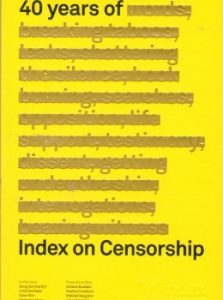
40 years of Index on Censorship March 2012
Salman Rushdie
March 2012, vol. 41, issue 1
Salman Rushdie’s first memories of censorship are cinematic: screen kisses brutalised by prudish scissors which chopped out the moments of actual contact. (Briefly, before comprehension dawned, he wondered if that were all there was to kissing, the languorous approach and then the sudden turkey-jerk away.) The effect was usually somewhat comic, and censorship still retains, in contemporary Pakistan, a strong element of comedy. When the Pakistani censors found that the movie El Cid ended with a dead Charlton Heston leading the Christians to victory over live Moslems, they nearly banned it until they had the idea of simply cutting out the entire climax, so that the film as screened showed El Cid mortally wounded. El Cid dying nobly, and then it ended. Muslims 1, Christians 0.
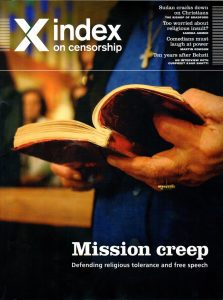
The winter 2013 issue of Index on Censorship magazine.
Defending the right to be offended
Samira Ahmed
December 2013, vol. 42, issue 4
The tensions between freedom of speech and religious belief remain acute – and they are systematically exploited by political groups of all stripes, from the English Defence League to radical Islamists who threaten to disrupt the repatriation of dead British soldiers at Wootton Bassett. The story consistently makes the headlines. The idea that there is an Islamist assault on British freedoms and values is widespread.
The Muslim campaign against Salman Rushdie’s The Satanic Verses in 1988 was the crucial moment in all this. It forced writers and artists from an Asian or Muslim background, whether they defined themselves that way or not, to take sides. They had to declare loyalty – or otherwise – to the offended.
Sometimes the letters from a prisoner of the regime in Belarus are full of encouragement and nice stories. While human rights defenders and activists speak up about severe detention conditions and beatings, psychological pressure and denial of medical assistance, the picture from the prisoners’ letters seems to be rather peaceful. Their imprisonment often looks like a retreat: they write about reading books and enjoying the fresh air during walks. The sharp contrast between the detention and what they write about may be confusing at first glance.
At this point, it is important to understand what the regime is like in Belarus. To be a political prisoner of the regime does not mean access to any prisoners’ rights or basic human rights, it does not mean respect for any rights in general. This also includes all rights to correspondence. In a country where people are detained for any oppositional political expression, down to wearing white-red-white socks, it would be naive to expect that the regime would not establish total information control over them in jail.
In Belarusian prisons, letters pass through strict two-way censorship regimes that consist of the combination of prison’s general regulations and specific treatment of those who are there for political reasons. Words, sentences, and even pages can be withdrawn, whole letters can be returned to the sender or simply disappear if the rules are not followed. This is, however, the best case scenario. In the worst-case, a person can be sent to a punishment cell, beaten, and threatened. Sometimes in the letters, you can actually hear a voice behind a prisoner’s back dictating to them, forcing words of praise for the administration of the penal colony or coerced requests aimed at relatives to cancel any legal complaints procedures. Such conditions make it impossible for political prisoners to open up and write about the ill-treatment they receive. What is left is to stay strong.
Political prisoners in Belarus have become experts at finding neutral topics to escape the censor’s ire. What is more, they know that the truth is theirs: they are not criminals, they are heroes of new Belarus who dared to stand face to face with the regime and reclaim their rights. However, one should not be tricked by the cheerful mood. Often, it is meant to support loved ones, ironically cover the pain after the unfair treatment, and thank those who ensure they are not forgotten.
Peruvian president Pedro Castillo’s first year in office has been interesting to say the least. Since his election on 28 July 2021, he has faced two impeachment requests for alleged corruption for peddling influence to favour contractors in public works and “permanent moral incapacity”; he has survived both.
Unlike most media-hungry politicians, Castillo has gone silent – he hasn’t spoken to the press for more than 100 days. The last time was in February 2022 when he said “this press is a joke”. This silence seems to have no end in sight.
Gabriela García, a Peruvian journalist based in Lima with independent journalism portal Epicentro.TV, says Castillo has slammed the door closed on journalists in the country.
“The last time I think he was able to speak to journalists was during his campaign. And then began a lot of corruption in his circle with his ministers. He knows there are reasons to investigate him, so he is silent because he is afraid,” says García.
According to Garcia, Castillo is not fulfilling promises he made during the presidential campaign – to work for the poorest, that he would respect the press and would strengthen women’s rights. If anything, he is doing the exact opposite.
Like many around the world, Peruvians are facing a rising cost of living and many people are starving.
“I was not against him at the beginning of the campaign, I really thought it was an opportunity for the poorest. All decisions are made and rely on Lima, but we have another Peru that is forgotten. I am very disappointed with this”, says García, referring to the 195 provinces outside the capital.
Garcia’s disappointment is shared by fellow Peruvian journalist Luís Burranca.
“We are witnessing possibly the most corrupt government since Alberto Fujimori in the early 2000s,” says Burranca. “There are already four prime ministers who have held office in just a year and we have a former minister of transport and communications on the run from justice”. The former minister, Juan Silva, has been accused of irregular acts in public tenders for works and corruption and there is currently a 50,000 soles (£10,000) reward for information on his whereabouts.
The lack of communication with the president and the parliament itself makes the work of the press very difficult. Cameras are not accepted inside the Peruvian parliament, for example.
The relationship between press and presidents in Peruvian was previously stable, says Garcia. She has always worked closely with the government, while at the same time asking politicians difficult questions.
“Presidents might not like it, but they’d let us do our jobs,” she says. “Alejandro Toledo and Ollanta Humala were able to understand that they were the presidents, so they couldn’t insult anyone. They were more aware of their roles, about the presidential hierarchy.”
“Castillo doesn’t understand the work of the press. He doesn’t know why an independent press is so important. He thinks we have to be nice and easy. He’s lucky to be where he is, but he’s not prepared at all,” she says.
The difficulties in reporting on Peru’s politics is not confined to government – there is a far-right group in Peru today that is a particular problem for journalists and anyone on the other side politically. La Resistencia was created in 2018 by people who identify themselves as Christians and “defenders of the homeland”. They consider themselves “albertists”, as they seek to follow in the footsteps of Alberto Fujimori, president of Peru between 1990 and 2000 and who was convicted of crimes against humanity. La Resistencia’s ideology is based on authoritarianism, conservatism and opposition to communism and LGBT rights.
“They are untouchable and aggressive towards journalists,” says Garcia. “They are being investigated, but nothing has happened so far. We don’t know who gives them money. They say they are independent, but we don’t believe them. They are a problem for everyone.”
Despite the challenges, García believes that the independent press is growing stronger in the country.
“We are fighting for independence. We know it’s not the same thing as traditional television with a lot more money. We’re fighting with this [she shows her pen] and nothing else.”
Against this backdrop, Garcia is “more afraid than ever for democracy” in Peru.
“It’s a broken country, with far-right and far-left ideas colliding all the time. We are closer to the edge than ever before,” she said.
Roberto Uebel, professor of international relations at Brazil’s Superior School of Propaganda and Marketing (ESPM) of Porto Alegre in Brazil, believes a free press is vital for democracy.
“In Latin America, there has always been distrust from governments regarding the work of the press. The idea of a persecution that does not exist, this is very particular to the Latin American political context, a relationship of distrust between political actors and the press”.
Yet many leaders in Latin America engage with media. Nicaragua and Venezuela’s leftist regimes have a relationship with the press, albeit a state press. Chile and Argentina’s presidents have an open relationship with journalists.
“In the case of Peru, it is a more left-wing regime and does not have such a positive relationship. A hundred days without talking to the press,” says Uebel. “This dichotomy is very dangerous, the left regime is more open, right regimes are more closed. It depends much more on the political figure in power than on the type of regime”.
Whether Castillo will complete his full term is open to question.
Since Ollanta Humala left office in July 2016, most of his successors have faced repeated impeachment attempts, setting an average for Peruvian presidents of just one and a half years in office, says Uebel. Martin Vizcarra, for example, ruled the country between March 2018 and November 2020, stepping down after an impeachment process for “moral incapacity” and accused of influence peddling and corruption during his term as regional governor of Moquegua.
“The idea of a constant impeachment has already been institutionalised in Peru,” says Uebel.
García says she doesn’t believe that Castillo will finish his full term.
“All the ministers being investigated for corruption are close to him. We have food shortages in this poor country that has faced two years of a pandemic. The government is weakened.”
Faced with growing disillusionment in his abilities and the ever-present threat of impeachment, Castillo may not be able to remain silent forever.